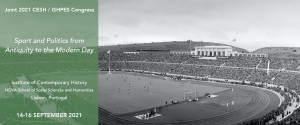24th CESH Congress, organized along with ISHPES, will be held at the Universidade Nova de Lisboa, Portugal, on 14-16 September 2021.
NEW FINAL PROGRAMME:
NEW General Assembly agenda, 15th September:
Introduction:
- Welcome by the President (Huggins)
- Nomination of a Recorder
- Apologies for absence
- Approval of the Minutes of the GA in Lausanne 2019
- Acceptance of the Agenda for Lisbon 2021
CESH Reports:
- President’s Report (Huggins)
- General Secretary’s Report (Viuda-Serrano)
- Treasurer’s Report (Jallat)
- Auditors’ Report (Faniopoulos)
- 10.Vote on the Reports
- 11. Nomination of two Auditors for 2021-22
College of Fellows:
- 12. Report on the college of Fellows of CESH (Albanidis)
- 13. Election of the President of the College of Fellows
- 14. Election of the new Directing Board of CESH
- 15. Proposal of a modification to the Internal Regulations for membership of the College of Fellows.
ESSH Journal:
- 16. Report of ESSH Editor (Bolz)
CESH Congresses:
- 17. Presentation of the 25th International CESH Congress 2022 in Bucharest (Romania)
- 18. Proposals for the next International CESH Congresses
Closing procedure:
- 19. AOB
Call for Papers: CESH-ISHPES-2021_CFP
Abstracts submission new deadline: 10 May 2021
Hybrid format: on-site and online. Choose yourself
2021 CESH Event: bit.ly/cesh2021
Reduced congress fee: 50€
Location: NOVA FCSH, Almada Negreiros College (NOVA’s Campolide Campus, 1099-085 Lisbon).
Date: 14-16 September 2021.
New information about ACCOMMODATION AND PAYMENT here: https://ihc.fcsh.unl.pt/wp-content/uploads/sites/15/2021/06/CESH-ISHPES-2021_logistics.pdf
The 24th edition of CESH congress, joint with ISHPES, will be held from 14 to 16th of September 2021 in Lisbon, Portugal. The theme of this year’s congress, « Sport and Politics from Antiquity to the Modern Day », aims to explore the historical configurations of the sports field and its relationship with a broad range of political processes.
CESH/ISHPES 2021 welcomes contributions centred on, but not limited to, the following research themes and questions:
- Sport and political regimes: How can we make sense of the transformations of the sporting experience in different political regimes? Is it possible or not to put forward a political periodization of sport? What is fascist (or communist) about fascist (or communist) sports practices and spectacles? Is there an essential break between aristocratic, authoritarian and democratic sports (and, if yes, at what levels)?
- Sport, race and colonialism: What role did sport play in colonial empires? How did the colonial politics of racial differentiation and hierarchization shape sports? And how was the colonial project shaped by sporting practices and ideologies? What can we learn about decolonization processes by putting sports centre stage? How did newly independent nations negotiate imperial memories and/or political projects of autonomy through sport? How do racialization practices operate on the sports field?
- Sports organizations as political institutions: What is political about sports institutions and governance? How do the politics of sports organizations and clubs relate to other spheres of the political? What are the political stakes in conflicts taking place inside sports institutions? What type of political mobilization takes place inside sports organizations? How do sport organizations and practices relate with mass and popular culture?
- Sport and imagined communities: In what ways and in which scales do sports clubs and sporting institutions come to serve as foci of community identification? How do these systems vary historically and geographically? What type of institutions shape these identifications? How do media discourses reproduce and transform sports cultures and identities? How do the moral grammars of different fan cultures relate with other identification systems (ie religious, political, regional) and other moral grammars?
- Sports and governmentality: How have state policies shaped sporting practices and landscapes? Which groups are the main targets of biopolitical technologies? Under which rationalities have specialists of the sports field exercised and legitimised their power? Which institutions have been at the forefront of the manage-ment and administration of bodies through sport? What systems of classification and identification have been applied by different state agencies to sports practi-tioners, fans and institutions?
- Sport and international relations: What type of role does sport play in international relations? How do national and international political questions impact on the sports field? Does the globalization of different sports practices and images follow the patterns of the international political system or does it have its own specific logics? How do sports mega-events allow us to reframe power relations in a global world?
- Sport and Gender: How has the relationship between sport and gender evolved? What can a history of sport tell us about the construction of gender categories? How can we reconstruct our understanding of sports as gendered practices? How do sports practices contribute to the production of gendered bodies?
Abstracts (maximum 300 words) along with a paragraph with biographical information, should be sent by email to: cesh2020@fcsh.unl.pt by 10 May 2021.
Besides individual papers, we also encourage the submission of panel proposals (up to three papers). In this case, convenors should also present an abstract for the panel (maximum 300 words) alongside the individual papers abstracts in a single file.

